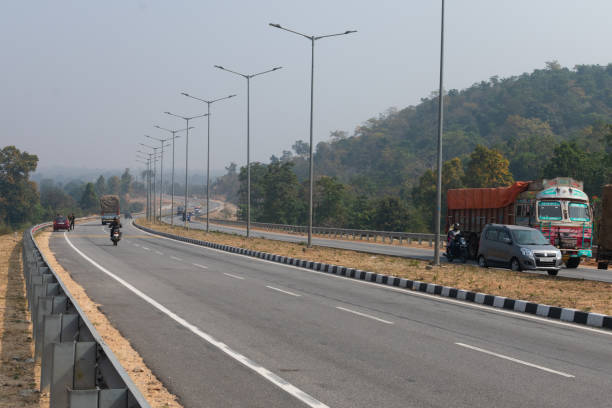National Highways has spent £330,000 on legal fees for six of Roads Investment Strategy 2 (RIS2) schemes, including more than £200,000 on its A303 Stonehenge tunnel, a freedom of information request from NCE has revealed. As the roads operator seeks to continue improving and expanding the nation’s trunk road network to add capacity and reliability, it has come up against challenges from campaigners who believe building new roads is incompatible with the need to decarbonize in the face of climate change. It is argued that road building is particularly energy intensive and therefore polluting work and will ultimately encourage greater car usage that will further pollute. To pre-empt these claims, National Highways utilizes legal advice to ensure that its development consent order (DCO) applications are robust in terms of environmental and community impacts. However, it still often faces legal challenges. RIS2 is National Highways’ investment plans for the five year period between 2020 and 2025. The £27.4bn budget includes the development of a number of new roads and upgrades that have been challenged by climate campaigners. The most contentious scheme in RIS2 is the A303 Stonehenge (Amesbury to Berwick Down). The £1.7bn scheme will dual a 13km section of road and include a new 3.2km tunnel built under part of the Stonehenge world heritage site. This has seen uproar not only from climate protesters but from those who believe it would be harmful to the iconic landmark. The Stonehenge scheme was given DCO approval by former transport secretary Grant Shapps despite the Planning Inspectorate’s recommendation to reject it. A campaign group called Save Stonehenge World Heritage Site was formed to fight against Shapps’ decision, which it deemed unlawful. It went to the High Court where, after a three day hearing, the campaign group won its case against the planning approval.

National Highways Has Spent £206,065.90.
building and defending its case for the A303 Stonehenge Tunnel in High Court. Despite the ruling, the roads operator has not given up on constructing the tunnel and has continued to develop the scheme while the decision on its DCO application is “re-determined”. Another major road scheme in the RIS2 envelope is the £950M A428 Black Cat to Caxton Gibbet, a new 16km dual carriageway between Bedfordshire and Cambridge. National Highways described it described as a “missing link of dual carriageway on the strategic road network between Milton Keynes and Cambridge” and Shapps gave DCO approval in August 2022. Climate campaign group Transport Action Network (TAN) challenged the decision to grant approval, saying that proper assessment of the climate impacts at local and regional levels had not been carried out. The legal challenge delayed the start of the works on the A428, but TAN was unsuccessful in getting a judicial review as a judge dismissed the case on all grounds. TAN appealed the decision but this was again rejected. National Highways spent £47,066.51 building and defending the case for its A428 Black Cat to Caxton Gibbet scheme. A trio of upgrades on the A47 have been challenged by climate campaigner Andrew Boswell. The North Tottenham to Easton dulling is worth £200M, the dulling of Bloomfield to North Burlingame is estimated to cost £100M and the upgrade of the A47/A11 Thickthorn junction is also valued at £100M. Boswell’s challenge against the schemes questions whether the transport secretary had properly applied the climate change implications of the A47 improvements, suggesting that consideration had not been given to the cumulative impact of the schemes. The case went to High Court on May 10 and as of May 16, when NCE’s FoI request was submitted, National Highways had spent a total of £73,282 on legal fees for the three schemes. The judge has to date reserved judgement on the case. The full sums spent by National Highways on legal fees for RIS2 road schemes is in the table below. A National Highways spokesperson said: “We always seek to deliver schemes in accordance with the planning process and public law. Some schemes are very complex, requiring extensive analysis and public engagement. Some decisions may give rise to legal challenge in the courts. We try to minimize any delays as much as possible.

“Legal support for National Highways Schemes.
is provided via the in-house legal team, but with external support where necessary. Where external legal support is engaged, the in-house team ensure value for money.” Transport Action Network director Chris Todd said: “This is public money that is being used by National Highways against the public interest. It is keeping its increasingly out of touch roads programmed going and undermining efforts to manage traffic and tackle climate change. There is no conceivable way that increasing road capacity, traffic and emissions is compatible with achieving net-zero quickly enough. The government has already accepted it is not on track to meet our internationally agreed target to cut emissions by 68% by 2030. These figures just add insult to injury. “The amount wasted on trying to defend the indefensible at Stonehenge is simply astounding. Both UNESCO and the Examination Panel roundly rejected its proposed scheme, yet rather than accept their damning verdicts it is still trying to foist its damaging scheme on the public. It is now wasting even more money greenwashing its proposals, rather than reworking the scheme to come up with something less damaging and more acceptable. It’s high time National Highways was held accountable for wasting public money.”


Recent Comments